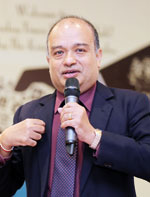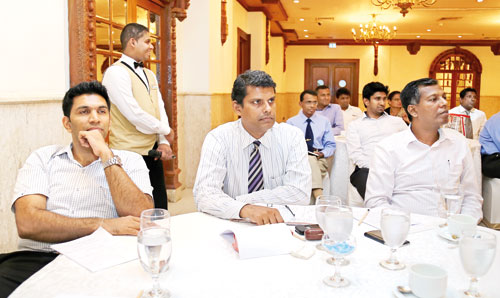Punctuality and indiscipline, major weaknesses among Sri Lankans
View(s):
Niranjan De Silva
Niranjan de Silva, at 14 years, had a mischievous bunch of friends at Trinity College amongst whom was a boy who one day said: “I want to be the CEO of a multinational company at the age of 28.”
“We laughed at this ridiculous idea, telling our friend that none of us even knew the word ‘CEO’ and for that matter ‘multinational’,” Mr. de Silva recalled.
Then one day, going to this boy’s house to play, they found a poster declaring ‘I will be a CEO’ on his bedroom, by the side of his bed and on his toilet door.
De Silva and his friends still didn’t take this seriously until one day, many years later, there was a call: “Hi Nira, do you know who this is? I became a CEO, six months before the promise I made (achieving this at 28 years),” Mr. de Silva said, relating the conversation with his school friend.
‘That is the power of a dream (which eventually came true),” said the former Metropolitan Computers Ltd CEO turned professional coach on Tuesday, regaling members of the Sunday Times Business Club (STBC) at the Kingsbury Colombo with an entertaining, off-the-cuff, vibrant and filled-with-action presentation on ‘how to fast-track your career’.

Audience
Bursting with energy (‘I retired after 34 years at Metropolitan and now enjoy the greatest time of my life with no stress and only joy to see how young people achieve their goals with a few of my tips’), de Silva popped out from his chair with a sprint and took the floor when he was called to speak.
Walking up and down the aisle like a ‘man on a mission,’ the former Metropolitan Computers CEO discussed the staid and hackneyed ‘mission, vision, objectives and goals’ concept that every company preaches, saying “if you don’t have a mission, vision and objective in life yourself, the company will get nowhere.”
He spoke on the importance of ‘dreams’, ‘passions’, ‘objectives’, ‘self-confidence’ and ‘communication skills’ among many other traits an individual should have and set to achieve; at all times filling gaps and pauses with stories and anecdotes that kept the audience, sometimes in fits of laughter and sometimes in serious mode.
Discipline and punctuality were some of the weaknesses of Sri Lankans even at the highest level, he said relating an episode in Japan to illustrate this point. A group of senior CEOs went to Japan for a 2-week training organized by JASTECA (the Japan-Sri Lanka Technical and Cultural Association) and in a pre-trip Colombo briefing they were specifically told (on four occasions) that they should be on time and punctual at the lectures.
 Often one of two CEOs would walk into the room 10 or 15 minutes late apologizing (but repeating it the next day). On one occasion the lecturer, a Japanese professor annoyed stopped his discussion, walked to one of the late-comers and asked, “have you come for the next lecture?”
Often one of two CEOs would walk into the room 10 or 15 minutes late apologizing (but repeating it the next day). On one occasion the lecturer, a Japanese professor annoyed stopped his discussion, walked to one of the late-comers and asked, “have you come for the next lecture?”
He said being passionate in the job is as important as having goals, objectives and a mission in life. He related a story about four technicians who joined a firm at the same time. Of them, one man would come into office walking briskly to his desk and running, up and down, getting as many things done as possible. Many years later, he rose to the top as a CEO while others moved up the ladder slowly, illustrating how passion can make an individual grow faster.
 He referred to instances when self-confidence and determination had helped people grow to what they wanted to be. Mr. de Silva also spoke about Kaizen, the Japanese method of management in which a small improvement everyday makes a great difference in life.
He referred to instances when self-confidence and determination had helped people grow to what they wanted to be. Mr. de Silva also spoke about Kaizen, the Japanese method of management in which a small improvement everyday makes a great difference in life.
“Learn something new or do something positive,” he exhorted, dressed in a swanky, suit and tie while most of the audience was dressed in office attire or smart casual.
“Why did I dress in suit? Because the first thing in being competitive is to be noticed; that is the first lesson, be noticed, be bold, go to the front seat when attending an event or conference; don’t stay at the back and be hidden,” he said, providing anecdotal evidence to strengthen his argument and ending an entertaining evening for STBC members and guests. Mr de Silva’s presentation was reminiscent of the famous world hit song by Bobby McFerrin “Don’t Worry, Be Happy”. (Feizal)


